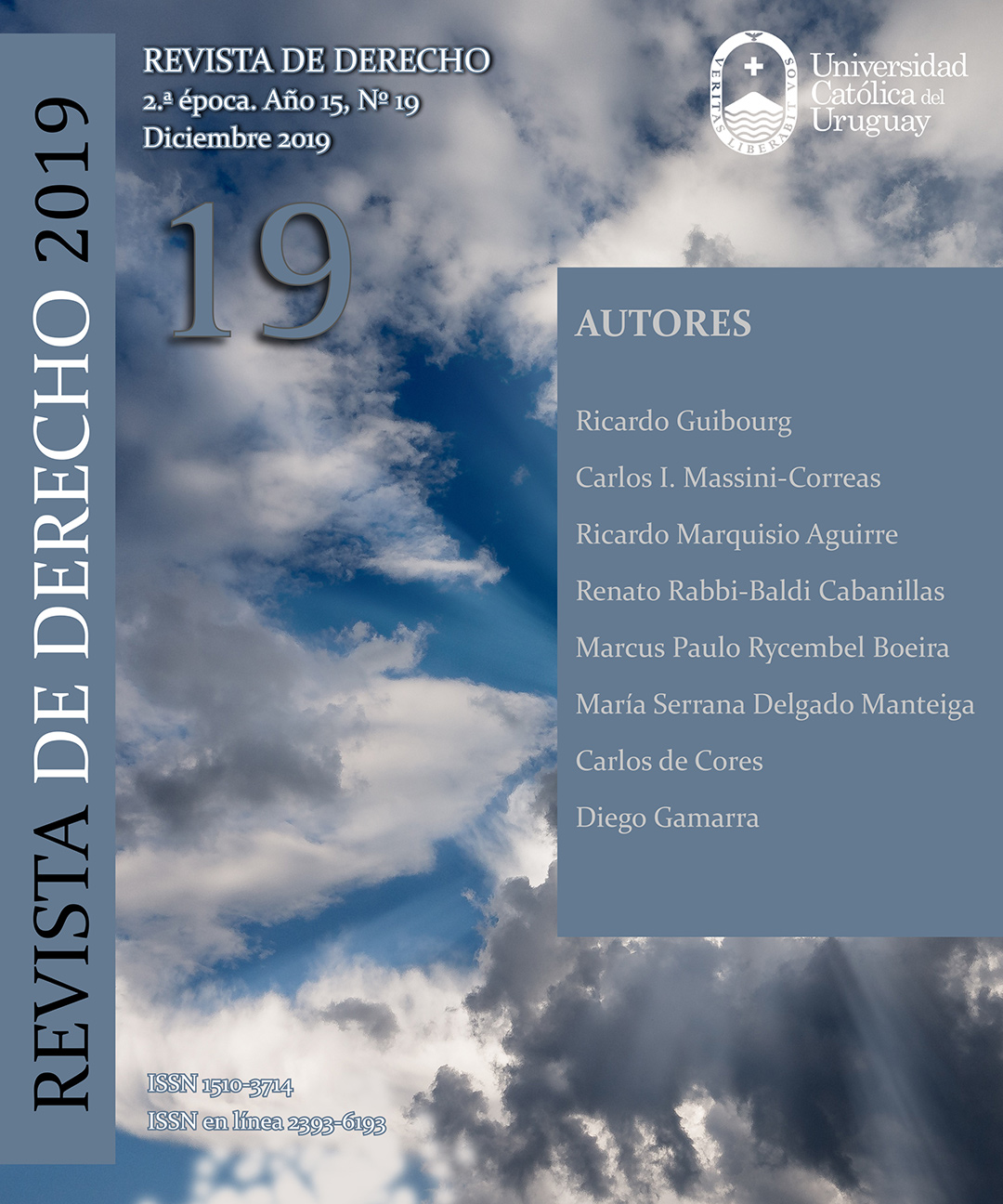Positivist arguments in the Post-positivist Age
DOI:
https://doi.org/10.22235/rd.v0i19.1733Abstract
I call Post-positivist Age the status of legal theory after the "Hart-Dworkin debate" in which positivism has lost the ambition that characterized it throughout history and that made it distinctive in its confrontation with Natural Law Theory: to give account of a specifically legal normativity, compatible with the skepticism or the avoidant position about the existence of an objective morality. In the Post-positivist Age, associated with a growing constitutionalization process that encompasses the philosophy of law itself, there are multiple proposals aimed at giving account of legal regulations and compatible with the social thesis, which currently is the common minimum in which the contemporary positivisms converge. The purpose of this paper is: (I) to identify some requirements that, within the framework of the challenges of constitutionalism, the positivist arguments should fulfill; (II) present some positivist emphases, based on the moral relevance of the distinction "to be / should be" of the law: anti-formalism, self-restriction of interpreters and intentionality of interpretation, contingency of the social world.
Downloads
References
Atienza, Manuel. “Ni positivismo jurídico ni neoconstitucionalismo: una defensa del constitucionalismo postpositivista”. Revista Argentina de Teoría Jurídica. V. 15 (2014), 1-29.
Atienza, Manuel. & Ruiz Manero, Juan. 2006. “Dejemos atrás el positivismo jurídico”, en: Ramos Pascua, J.A. y Rodilla González, M.A (eds.), El positivismo jurídico a examen. Estudios en homenaje a José Salgado Pintos. Salamanca: Ediciones Universidad de Salamanca, (2006) 765-780.
Austin, John. The Province of Jurisprudence Determined. Indianapolis: Hackett Publishing Company Inc (1954) [1832].
Bix, Brian. Jurisprudence. Durham: Carolina Academic Press (2009).
Bulygin, Eugenio. “¿Está parte de la filosofía del Derecho basada en un error?” Doxa 27, (2004) 15-26.
Campbell, Tom. Rights. A Critical Introduction. New York: Routledge (2006).
Conklin, W. E. The Invisible Origins of Legal Positivism. New York: Springer (2001).
Dickson, Julie. “Legal Positivism: Contemporary Debates”, en Marmor, Andrei (ed.) The Routledge Companion to Philosophy of Law. New York: Routledge (2012), 48-64.
Dworkin, Ronald. “The Model of Rules”. University of Chicago Law Review, Vol. 35, (1967) 14-46.
Dworkin, Ronald. Taking Rights Seriously. Cambrige (MA) Harvard University Press (1977).
Dworkin, Ronald. Law’s Empire. New York: Harvard University Press (1986).
Dworkin, Ronald. “Objetivity and Truth: You’d Better Believe It”. Philosophy & Public Affairs, Vol. 25, Issue 2, (1996) 87-139.
Dworkin, Ronald. Justice in Robes. Cambridge (MA): Belknap Press (2006).
Dworkin, Ronald. Justice For Hedgehogs. Cambridge (MA): Belknap Press (2011).
Endicott, Timothy. “Legal Interpretation”, en Marmor, A. (ed.), The Routledge Handbook to Philosophy of Law. New York: Routledge, (2012) 109-122.
Ferrajoli, Luigi. “Constitucionalismo principialista y constitucionalismo garantista”. Doxa, 34, (2011) 15-53.
Finnis, John. “The Truth in Legal Positivism”, en George, Robert. P., The Autonomy of Law. Essays on Legal Positivism. New York: Oxford University Press, (1999) 195-214.
Finnis, John. “Natural Law: The Clasical Tradition”, en Coleman, Jules & Shapiro, Scott, The Oxford Handbook of Jurisprudence & Philosophy of Law. New York: Oxford University Press, (2002) 1-60.
Gaido, Paula. Las pretensiones normativas del derecho. Un análisis de las concepciones de Robert Alexy y Joseph Raz. Madrid: Marcial Pons (2011).
García Amado, Juan Antonio. “Sobre el neoconstitucionalismo y sus precursores”, en Mantilla Espinosa, F. (ed.), Controversias constitucionales. Bogotá: Editorial Universidad del Rosario, (2008) 24-69.
García Amado. Juan Antonio. “Sobre formalismos y antiformalismos en la Teoría del Derecho”. Eunomía, 3, (2012) 13-43
García Figueroa, Alfonso. “Neoconstitucionalismo: dos (o tres) perros para un solo collar. Notas a propósito del constitucionalismo juspositivista de Luigi Ferrajoli”. Doxa, 34, (2011) 121-137.
Gardner, John. “Legal Positivism: 5½ Myths,” 46 American Journal of Jurisprudence, (2001) 199-227.
Green, Leslie. “Positivism and the Inseparability of Law and Morals”. New York University Law Review, Vol 83, (2008) 1035-1058.
Guastini, Riccardo. “A propósito del neoconstitucionalismo”. Gaceta Constitucional, 67, (2013) 231-240.
Guastini, Riccardo. La sintáxis del derecho. Madrid: Marcial Pons (2016).
Hart, H.L.A. “Positivism and the Separation of Law and Morals”. Harvard Law Review, 71, vol 4, (1958) 593-629.
Hart, H.L.A. The Concept of Law. New York: Clarendon Press (1961).
Kelsen, Hans. Teoría pura del derecho. México D.F.: UNAM (1979).
Leiter, Brian. (ed.). Objetiviy in Law and Morals. New York: Cambridge University Press (2001).
Leiter, Brian. “Legal formalism and legal realism. What is the issue”. Legal Theory, 16 (2), (2010) 111-133.
Luque, Pau. De la Constitución a la moral. Conflictos entre valores y el Estado constitucional. Madrid: Marcial Pons (2014).
Marmor, Andrei. Interpretation and Legal Theory. Portland: Hart Publishing (2005).
Marmor, Andrei. Philosophy of Law. Princenton: Princeton University Press (2011).
Marquisio, Ricardo. Una teoría normativa de la democracia. La agencia colectiva como ideal regulativo. Montevideo: FHCE (2014).
Marquisio, Ricardo. “Teoría del derecho y filosofía moral”. Revista de la Facultad de Derecho, UDELAR, 38, (2015) 135-160
Marquisio, Ricardo. 2016. “Creencias y razones constitucionales. Algunos problemas conceptuales y normativos del Estado (neo)constitucional”. V Encuentro Internacional de CONPEDI (2016). Disponible en http://www.conpedi.org.br/publicacoes/9105o6b2/25ph1zi5/pjRqS74QN21B9Y7o.pdf.
Marquisio, Ricardo. “La idea de una autoridad democrática. Revista de la Facultad de Derecho, UDELAR, Nº 40, (2016) 177-207
Marquisio, Ricardo. “Tres modelos de postpositivismo jurídico”. Revista Anales de la Facultad de Ciencias Jurídicas y Sociales. UNLP, Nº 47, (2017) 864-885.
Marquisio, Ricardo. “El ideal de autonomía moral”. Revista de la Facultad de Derecho, UDELAR, 43, (2017) 55-92.
Marquisio, Ricardo. “El constructivismo moral y la necesidad del punto de vista jurídico”. UNA Revista de Derecho. Universidad de los Andes. Nº 2, 1-40 (2017).
Disponible en https://una.uniandes.edu.co/images/pdfedicion2/articulos/Marquisio-2017---UNA-Revista-de-Derecho.pdf
Moreso, Juan José. “Antígona como defeater. Sobre el constitucionalismo garantista de Ferrajoli”. Doxa, 34, (2011) 183-199.
Moreso, Juan José. “Positivismo contemporáneo”. Enciclopedia de Filosofía y Teoría del Derecho, vol. I. México DF: UNAM, (2015) 171-205.
Murphy, Mark. Natural Law in Jurisprudence and Politics. New York: Cambridge University Press (2006).
Nourse, Victoria. Misreading Law, Misreading Democracy. Cambridge, MA: Harvard University Press (2016).
Plankett, David. & Shapiro, Scott. “Law, Morality and Everything Else: General Jurisprudence as a Branch of Metanormative Inquiry”. Ethics, 128, (2017) 37-68.
Raz, Joseph. “Kelsen Theory of the Basic Norm”, en Paulson, Stanley & Litchwsky Pauslon, Bonnie, Normativiy and Norms. Critical Perspectives on Kelsenian Themes. New York: Clarendon Press, (1998) 47-68.
Raz, Joseph. Practical Reason and Norms. New York: Oxford University Press (1999).
Raz, Joseph. “The Argument from Justice, or How Not to Reply to Legal Positivism”, en Pavlakos, G. (ed.) Law, Rights and Discourse: The Legal Philosophy of Robert Alexy. Portland: Hart Publishing, (2007) 17-36.
Raz, Joseph. Between Authority and Interpretation. New York: Harvard University Press, (2009) 268-269
Sager, Lawrence. “Putting Law in its Place”, en Waluchow, W. & Sciaraffa, S. The Legacy of Ronald Dworkin. New York: Oxford University Press, (2016) 117-130.
Shapiro, Scott. “The ‘Hart-Dworkin’ Debate: A Short Guide for the Perplexed”, en Ripstein, A. (ed.), Ronald Dworkin (New York: Cambridge University Press, 2007, pp. 22-55).
Shapiro Scott. Legality. Cambridge (MA): Belknap Press (2011).
Somek, Alexander. The Legal Relation. Legal Theory After Legal Positivism. New York: Cambridge University Press (2017).
Tagartt, Christopher. “How Can Positivism Account for Legal Adjudicative Duty”. Oxford Legal Studies, Vol 33, Nº 1, (2013) 169-196.
Vega, Jesús. “La filosofía del derecho como filosofía práctica”. Revus, Journal of Constitutional Theory and Philosophy of Law (2017). Disponible en https://journals.openedition.org/revus/3990;
Waldron, Jeremy. “The Irrelevance of Moral Objetivity”, en George, Robert P. (ed.), Natural Law Theory. New York: Oxford University Press, (1992)158-18.
Waldron, Jeremy. “Legal and Political Philosophy”. Coleman, Jules & Shapiro, Scott (ed.) The Oxford Handbook of Jurisprudence & Philosophy of Law. New York: Oxford University Press, (2002) 352-381.













